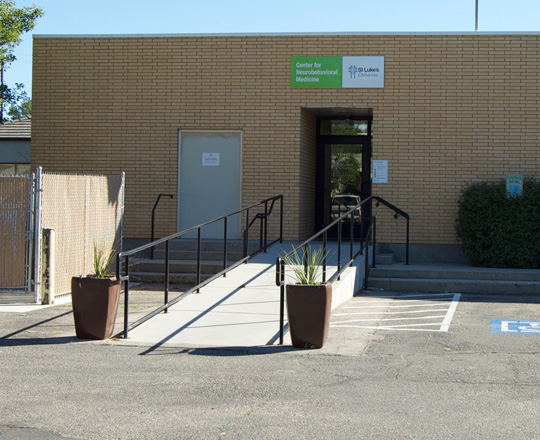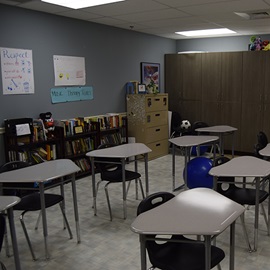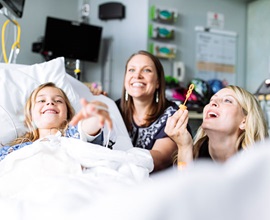
St. Luke’s Children’s Partial Hospitalization and Intensive Outpatient Program serve adolescents and their families seeking a higher level of mental health care. These programs provide environments in which youth feel valued and cared for, and where they can develop skills that will stay with them throughout their lives.
A patient’s length of stay and frequency of attendance depends on their unique clinical needs, which are determined by their mental health diagnosis, need for structure, and level of functioning.
A patient’s length of stay and frequency of attendance depends on their unique clinical needs, which are determined by their mental health diagnosis, need for structure, and level of functioning.

Partial Hospitalization
Partial hospitalization is a level of care between outpatient, such as a therapist’s office, and inpatient, such as a hospital or residential facility. Youth ages 12-17 and their families engage in an intensive therapeutic setting and seek to make progress with emotional and behavioral stability, family conflict, self-harm behaviors, academic failure and interpersonal problems due to emotional health challenges.
What to Expect
- Five-to-six therapy groups per day, Monday-Friday
- Weekly psychiatric medication evaluation and management with a child psychiatrist
- Individual therapy twice weekly and family therapy once weekly
- Group therapy drawing from a broad range of evidence-based interventions such as cognitive behavioral therapy, dialectical behavioral therapy, social emotional learning and experiential therapy
- One hour of educational work each day with instruction provided by an educator who holds both general and special education credentials
- Care coordination, transition and discharge planning
The average length of stay for this program is five weeks.
Referral: A referral from your child’s primary care provider, psychiatrist or nurse practitioner is required. You will then complete an intake with our clinical manager and clinical psychologist to determine if our program is an appropriate fit.

Intensive Outpatient Program
This is a less intensive approach than hospitalization or day treatment. It may be appropriate for youth ages 14-17 who need more than weekly sessions with their outpatient therapist or who are stepping down from a day treatment, inpatient or residential program.
What to Expect
- Six therapy groups per week, Tuesday-Thursday
- Interventions include:
- Dialectical behavioral therapy (DBT) skills group
- Multifamily skills group in which teens and parents participate together
- Process and social skills group
- Individual therapy once weekly and family therapy a minimum of once monthly
- Minimum of nine hours of treatment per week available
The program consists of nine hours of treatment per week, three hours per day, Tuesday-Thursday from 2-5 p.m. The average length of treatment is 12 weeks.
Referral: A referral from your child’s primary care provider, psychiatrist, nurse practitioner or mental health therapist is required.
Program Details
-
Who Can Attend
-
Your adolescent may be appropriate for one of our programs if they:
- Are cognitively capable of actively participating in group and individual therapy
- Have safe and appropriate housing locally for length of stay
- Have parents/guardians who will arrange transportation to and from treatment
- Can live at home safely
- Have difficulty managing intense emotions
- Have a history of suicide attempts and/or suicidal thoughts
- Have a history of cutting or other self-injurious behavior
- Have shown school refusal or avoidance
- Have had previous therapy or failed treatment
- Have pervasive repeated patterns of interpersonal difficulty
-
-
Exclusionary Criteria
-
- Primary substance abuse disorder
- Primary eating disorder
- Inability to participate in group, family or individual therapy
- Aggressive behavior that cannot be maintained at day treatment or intensive outpatient level of care
-
-
St. Luke's Children's Center for Neurobehavioral Medicine1075 E. Park Blvd., South Entrance
Boise, Idaho 83712
208-381-5970
-
Emergency SupportIf your child has a medical emergency, please call 911 or go immediately to the nearest Emergency Department (ED).If your child is having thoughts of suicide, any time, day or night, they need to be evaluated immediately. Please call 911 or go immediately to the nearest ED.



